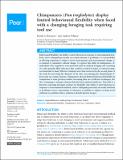Files in this item
Chimpanzees (Pan troglodytes) display limited behavioural flexibility when faced with a changing foraging task requiring tool use
Item metadata
| dc.contributor.author | Harrison, Rachel Anne | |
| dc.contributor.author | Whiten, Andrew | |
| dc.date.accessioned | 2018-02-21T11:30:05Z | |
| dc.date.available | 2018-02-21T11:30:05Z | |
| dc.date.issued | 2018-02-19 | |
| dc.identifier | 252202899 | |
| dc.identifier | f371ac10-aa88-4051-abdd-ed5e00ee72b5 | |
| dc.identifier | 85042375761 | |
| dc.identifier | 000426515100002 | |
| dc.identifier.citation | Harrison , R A & Whiten , A 2018 , ' Chimpanzees (Pan troglodytes) display limited behavioural flexibility when faced with a changing foraging task requiring tool use ' , PeerJ , vol. 6 , e4366 . https://doi.org/10.7717/peerj.4366 | en |
| dc.identifier.issn | 2167-8359 | |
| dc.identifier.other | ORCID: /0000-0003-2426-5890/work/65014028 | |
| dc.identifier.uri | https://hdl.handle.net/10023/12767 | |
| dc.description | This work was supported by a John Templeton Foundation grant ID 40128 to Andrew Whiten. | en |
| dc.description.abstract | Behavioural flexibility, the ability to alter behaviour in response to environmental feedback, and to relinquish previously successful solutions to problems, is a crucial ability in allowing organisms to adapt to novel environments and environmental change; it is essential to cumulative cultural change. To explore this ability in chimpanzees, 18 individuals (Pan troglodytes) were presented with an artificial foraging task consisting of a tube partially filled with juice that could be reached by hand or retrieved using tool materials to hand. Effective solutions were then restricted in the second phase of the study by narrowing the diameter of the tube, necessitating the abandonment of previously successful solutions. Chimpanzees showed limited behavioural flexibility in comparison to some previous studies, increasing their use of effective techniques, but also continuing to attempt solutions that had been rendered ineffective. This adds to a literature reporting divergent evidence for flexibility (the ability to alter behaviour in response to environmental feedback, and to relinquish previously successful solutions to problems) versus conservatism (a reluctance or inability to explore or adopt novel solutions to problems when a solution is already known) in apes. | |
| dc.format.extent | 28 | |
| dc.format.extent | 1311742 | |
| dc.language.iso | eng | |
| dc.relation.ispartof | PeerJ | en |
| dc.subject | Behavioural flexibility | en |
| dc.subject | Chimpanzees | en |
| dc.subject | Tool-use | en |
| dc.subject | Cumulative culture | en |
| dc.subject | BF Psychology | en |
| dc.subject | DAS | en |
| dc.subject.lcc | BF | en |
| dc.title | Chimpanzees (Pan troglodytes) display limited behavioural flexibility when faced with a changing foraging task requiring tool use | en |
| dc.type | Journal article | en |
| dc.contributor.sponsor | John Templeton Foundation | en |
| dc.contributor.institution | University of St Andrews. School of Psychology and Neuroscience | en |
| dc.identifier.doi | 10.7717/peerj.4366 | |
| dc.description.status | Peer reviewed | en |
| dc.identifier.grantnumber | 40128 | en |
This item appears in the following Collection(s)
Items in the St Andrews Research Repository are protected by copyright, with all rights reserved, unless otherwise indicated.

